Book Digest: February 5, 2007
Last week was busy and productive wherein, prefatory to scheduled conversations with the authors, I read Naked Sleeper by Sigrid Nuñez, House of Meetings by Martin Amis, and Zoli by Colum McCann—all excellent—and then, of course, carried out the conversations which should see the light of day, um, soon. And as far as I can see into the future (a few months), I’m looking forward to the publication of a slew of books by some of my favorite authors—of which you will be informed in due time.
Anyway, might you remember this from Elmore Leonard’s Get Shorty?
“
And: RIP, Molly Ivins
Jim Brown: The Fierce Life of an American Hero by Mike Freeman
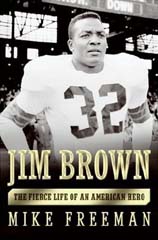
This will not be the last time (let me know if it gets banal) I express my concerns about the degradation of various human faculties—mainly memory. On this particular Super Bowl Sunday (one of many degenerative agents I would point to contributing to this decline), it seems fitting to note accomplished sports journalist Mike Freeman’s new biography of Jim Brown, whom many people with reasonable recall believe was the greatest (American) football player of all time. Brown, of course, played before celebrity came to dominate our cultural landscape. A star athlete at Syracuse—playing football and a truly violent game, lacrosse—he was a perennial Pro Bowler in his nine years in the NFL, setting numerous records, and was an indisputable Hall of Fame choice in 1971. None of which recommends a jock biography to us brainy types. However, Brown was more than a football star. He was Hollywood’s first black action star (“figure” may be more appropriate to his leaden acting style)—it’s amazing to consider the uproar created by his on-camera love scene with ‘70s hottie Raquel Welch—and was also a potent civil rights activist. And then there were the various womanizing scandals. All of which makes for a pretty good story and a snapshot of that vague thing referred to in daily parlance as “back in the day.”
» Read an excerpt from Jim Brown
Kockroach by Tyler Knox
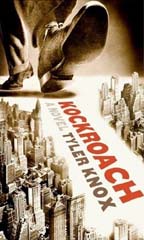
I suppose novels spawned by the legendary Kafka tale The Metamorphosis would make an interesting subgenre. (And no doubt more than a few PhD theses have been occupied with this parable.) The one I am most familiar with is Mark Estrin’sInsect Dreams, though Knox’s entry into this arena is a worthy effort. Knox’s rendition is set in Times Square in the ‘50s, where the aptly named protagonist wakens to find himself a human—the guiding conceit in this narrative is the amazing adaptability of the cockroach. Thus, in acquiring human skills, Tyler Knox’s cockroach has the opportunity—which he makes use of—to lampoon mid-20th century American culture. Granta deputy editor Matt Wieland astutely observes:
Infinite JestThe Simpsons
» Read an excerpt from Kockroach
The River of Lost Footsteps: Histories of Burma by Thant Myint-U
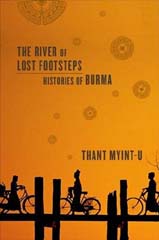
I frequently like and get my history from fiction—since I am outside the gates of academia and matters of state or high finance don’t depend on my factual grasp of these matters, I feel no qualms about seeing the known universe in this way. Thus, my previous knowledge comes from wonderful novels by Amitav Ghosh (The Glass Palace), Daniel Mason (The Piano Tuner), and Vyvienne Loh (Breaking Tongue). Now comes Thant Myint-U (whose grandfather was a well-regarded U.N. secretary-general in the 1960s) with a charming account of Burma, which in the past four decades has been under a terrible military dictatorship. (Note the harassment and house arrest of Nobel Peace Prize recipient Aung San Suu Kyi.) Thant Myint-U weaves a personal and historical account that reads as smoothly as a literary narrative.
» Read an excerpt from The River of Lost Footsteps
Peter Dexter: Paper Trails: True Stories of Confusion edited by Rob Fleder
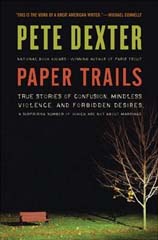
Former newspaper columnist-turned-novelist and screenwriter (Rush and Mulholland Falls) Pete Dexter, whose Paris Trout won a National Book Award and who has written five other eminently readable novels, including Deadwood and the undervalued Train, is well represented in this anthology of 82 of his columns collected by editor Rob Fleder and including an introduction by Dexter and foreword by Pete Hamill. Dexter, Carl Hiaason, and Hamill make up a triumvirate of “paperboys” who remind me why I once found reading the daily newspaper a treat, and more to the point, made me realize that today’s big-city newspaper is little more than a vestigial media organ. Too bad.
The Gardens of the Dead by William Brodrick
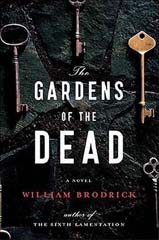
I am not a fan of crime story/thriller series, and I don’t know that I will be following William Brodrick (the same goes for the excellent Michael Gruber, who thankfully has put away his Cuban former homicide cop—look for his next opus,The Book of Air and Shadows) much further than this sophomore effort from the author of an able thriller—the Sixth Lamentation. Father Anselm, a barrister-turned-monk, is one of three people who posthumously receive packets regarding an old case from former colleague Elizabeth Glendinning, Q.C. Anselm, whose story echoes the circumstances of Broderick’s own life, poses the important questions that lift the narrative beyond the typically superlative procedural. Suspense and complexity make for a haunting read, as do the well-crafted prose and the clearly lit picture of the English legal process.
Epitaph for a Tramp (The Harry Fannin Detective Novels) by David Markson
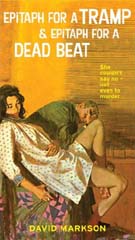
I am not sure there is still any credence given to the position that genre fiction is inferior to the literary sort. In any case, these early crime novels by master novelist David Markson, author of the revered masterpiece Wittgenstein’s Mistress and adored by a Who’s Who of contemporary literature, should quell that malignant argument. Allegedly written to pay his rent—no doubt his great works failed in that important matter—Markson’s pulp fiction is credited with rivaling Raymond Chandler’s (the boozy pose by the nightie-clad brunette on this softcover edition is an amusing throwback to the revolving drugstore book racks). SaraWeinman, who knows a lot about the crime-story world, opined recently:
More important, Markson gives his characters, especially Fannin, surprising emotional depth often absent in the work of his pulp contemporaries. The Fannin novels may not be “the best since Chandler,” as the jacket copy declares, but they hold up well nearly 50 years after their original release and are fascinating literary curiosities for devoted Markson fans and crime-fiction lovers alike.
Fame Junkies: The Hidden Truths Behind America’s Favorite Addiction by Jake Halpern
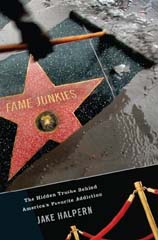
If you want the answer to the question, “Why do more people watch the ultimate competition for celebrityhood, American Idol, than watch the nightly news on the three major networks combined?” Or the inordinate attention paid to Paris Hilton? I’m not sure that NPR reporter Jake Halperin’s book answers these questions (which are surely more complex and deep than a 216-page anecdotal account can deliver), but based on his first book, Braving Home, I’d say he has a proven ability to provide compelling evidence and some shrewd analysis. For instance:
Q:
A:
Also, Michael Joseph Gross’s Starstruck is an insightful tome limning the same seemingly bottomless subject matter.
» Read an excerpt from Fame Junkies
Toussaint Louverture by Madison Smartt Bell
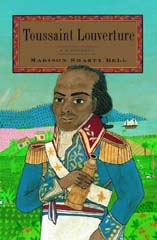
Above, I alluded to a certain propensity to take my history lessons from fiction—a perfect case in point is my reading of the first book in Smartt Bell’s impressive trilogy of novels (All Soul’s Rising, Master of The Crossroads, and The Stone that the Builder Refused) on the life of criminally unheralded 19th-century Caribbean revolutionary Toussaint Louverture. Now comes Bell with the first biography about Louverture to appear in English in more than 50 years. Toussaint has been known either as a revolutionary martyr or a savage leader of the violence that culminated in Haitian independence, and Bell admirably delivers a measured and useful account. Best of all we have a choice of sources—fictional or non.
Finn by Jon Clinch

Who is Jon Clinch? And how does he have the audacity to take on the task of “prequeling” Mark Twain’s Huckleberry Finn by creating a novel around the life of Huck’s father? It turns out Clinch is a former advertising executive who has delivered a resonant adjunct to the Finn tale with a small ensemble of vivid characters—Finn’s father, brother, his slave mistress, a blind moonshiner, and not least his son Huck. It has, of course, been years since I have read either of Mark Twain’s classics (Huckleberry Finn and Tom Sawyer), and I think it a good sign that my dim recollection was irrelevant to the enjoyment of Clinch’s sure-handed telling.
Actually, I think it surprising that there have not more of these kinds of efforts—one of which I am aware of and can commend is Nancy Rawles’s My Jim, the continued story of the slave Jim, Huck’s companion.
» Read an excerpt from Finn
